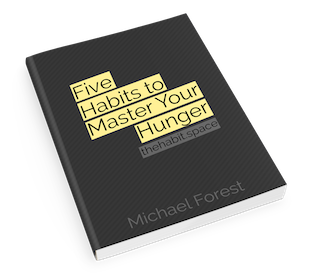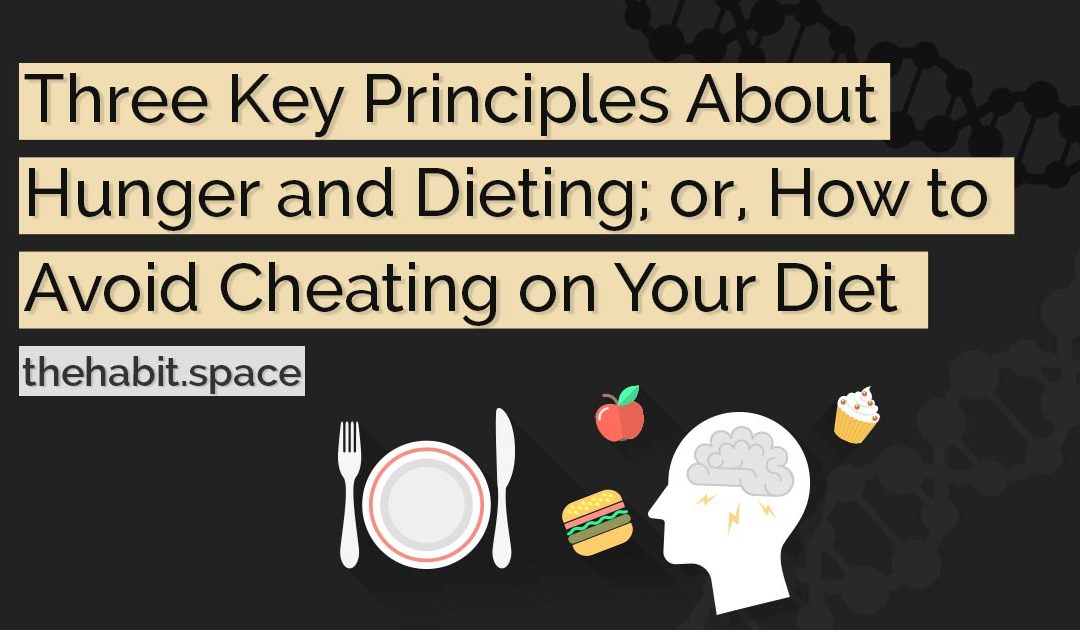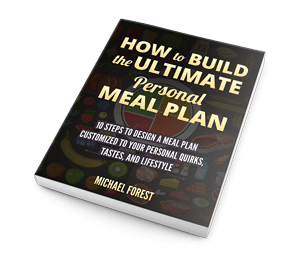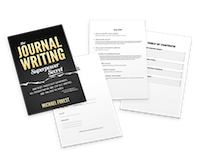So, you wanna diet, eh?
Well then, if you want to avoid cheating on your diet or giving in and binging two weeks into your diet, you'll consider hunger, cravings, and your brain.
Here are three principles about hunger you should understand, in order to create a meal plan and diet that works for you, and prevents cheating on your diet. No meal plan can prevent cheating 100%, but a good meal plan can go a long way towards helping with this.
Principle 1.
For Fat Loss, Certain Forms of Hunger Are Necessary
You won’t lose weight if you never, ever feel hungry. That's just life. But being hungry doesn't have to mean “thinking about food all the time” or “being low on energy” or anything at all like that.
Just the opposite.
In many of his books on dieting, Scott Abel refers to what he calls “tolerable hunger.” (Much of this post is certainly influenced by his work. The most relevant book of his would probably be Beyond Metabolism. Those who've read his stuff will see I'm framing things a little differently.)
Instead of just “tolerable” hunger, I call this the “sweet spot” of hunger, because it refers to a few different things that happen when you achieve it.
For the sweet spot (and why I even call it that), I want to emphasise two things:
- It really is a desirable state of being. I don't even mean oh you should desire it “just because” it means fat loss, and so you should want to put up with it. No, I mean a bit of hunger is itself a productive, happy place to be. Fat loss aside, it is even a better place to be than experiencing too little hunger. (But for me not to sound insane, this requires elaboration, so read on.)
- The sweet spot of hunger is also a “goldilocks” state of being. You have to get it juuuust right. Not hungry enough? No fat loss, and you're actually less productive. Too hungry? You're out of the sweet spot, and things become super unpleasant, and bad things happen. Either you cheat on your diet, or you resist it, but your body fights back.
Let me take this a step further:
Staying in the sweet spot of hunger is perhaps your number one priority for fat loss. More than the “perfect foods” or the “perfect calorie level” or the “perfect exercise program” or anything like that. In fact, all these things are only perfect insofar as they keep you inside the “Sweet Spot.”
This is one reason why a guy like Scott Abel will focus so much on biofeedback and the body's signals, and less on external cues like scale weight. If you're paying attention, your body will tell you:
- If you're losing fat.
- If you're doing so in a healthy manner
- If you're going to be able to continue without a negative metabolic reaction
Let's look at how the sweet spot feels, relative to too much hunger or too little hunger.
The Sweet Spot of Hunger:
- You’re more productive. Good things happen in the brain, generally relating to the release of catecholamines.
- You have a ton of energy. We weren’t built to be “full.” That’s not when we’re at our peak. You don't feel “heavy.” (Compare this to having a big meal right before playing an intense sport. Not good!)
- You feel hungry, but — when you're really in that sweet spot — you feel no urge to cheat on your diet, and you don’t think about food. It’s almost weird. If you pause and think about it, you can identify, yes, hey, “I'm hungry.” But this doesn't bother you, and you move on with your day. This is the hardest part to accomplish, but it's not insanely difficult.
- You lose fat, not a bunch of muscle. Feeling hunger, yet still having good energy, is a sign that your body is letting go of its fat stores. If you feel hungry but lose the energy, you'll start losing weight, but less of it will be fat, and your body starts trying to hold on to fat stores and turning preferentially to… other stores (e.g. muscle, lean tissue.)
Now let’s compare the sweet spot of hunger to too much hunger.
Too Much Hunger
- You can’t think straight, so you get nothing done. Concentration seems difficult. You're easily distracted.
- You fantasize about food all day. When it gets really bad, you dream about it. As you can see, this is actually the exact opposite experience you get when you're in the sweet spot.
- You also get cranky. Too many stress hormones get released. You get worn down, because our bodies are good at dealing with acute stresses (“Look, a tiger! Run!“), at least when they are followed by a chance to recover and adapt, but our bodies are terrible at dealing with chronic stress (“ho hum… I hate my job, and don't get enough sleep”). Prolonged high levels of hunger is one form of chronic stress.
- Your energy starts to plummet. Your body starts panicking. It shuts down things like, oh, I dunno, your sex drive. You can’t reproduce if you can’t get enough energy even for yourself, so the body releases chemicals in the brain telling you to take care of that first before you think about spreading genes.
Not much fun, is it?
For the sake of completeness, let's also look at what it feels like when you have too much food, and not enough hunger.
Too Much Fullness, and Not Enough Hunger
- You feel sluggish and slow, weirdly. Why? You can’t explain it. What's happening is your body is spending so much energy just digesting that you’re not working at optimal capacity.
- You’re in a brain fog. (It feels slightly different than the lack of concentration you get when you're too hungry and not getting in enough energy, but the end result is the same.)
- Your energy does come, but it’s wildly up and down, and you find it hard to control of. This is insulin being a jerk, mostly. If you don't do things right, you end up on the roller coaster. You spike things with a meal and feel energy, but then energy plummets, so you have a meal again, but all that happens is another quick up and down. You get caught in a loop.
- Obviously, you don’t lose fat. Depending on how much food you're taking in, you start storing it.
Now, here’s the thing that can make things difficult: of course too much food is bad for fat loss. Duh.
But at the same time, you need to be honest with yourself: are you actually taking in too much food? Or are you just in the early stages of your diet?
That leads us to principle number two!
Principle 2.
Hunger is Cumulative
Hunger doesn’t fully “reset” every single time you eat a meal or go to sleep.
What this means is that if you’re in a caloric deficit for weeks on end, you will experience more hunger between meals at the end of your diet than you did at the beginning.
- At the beginning, sometimes it feels as though you’re eating “all the time.” You genuinely feel “almost full” after meals, as though you’re eating too much.
- By the end, with the very same meal plan, you really feel that hunger. After almost every meal, you think, “Was that it?” You can eat food, and you don’t even seem to sense it in your stomach.
This is why new dieters “think” they’re eating too many calories, when really they just need to wait it out. The hunger will come… oh, will it ever.
Note that if you’re very overweight, it might take longer, but that’s not a big deal. Enjoy it. Your body is just turning to its own fat stores with no real problem. Eventually, you'll get there, don't worry. Above 20% bodyfat for men, and maybe 33% for women, and cumulative hunger is less of an issue.
Spike or “cheat” meals and resetting hunger
As a side note, you can “reset” the sense of cumulative hunger by having a spike meal, that is, a purposeful planned cheat meal. The reason that hunger seems to add up is the drop in the hormone leptin (and the rise in ghrelin it causes) as you continue to diet.
A lack of glycogen can also give you this feeling.
Well, a spike in calories and carbs spikes leptin, so that your hunger is basically reset.
Briefly, the idea for a planned, purposeful cheat — as it relates to hunger and avoiding “unwanted” cheating — is this:
- After the spike meal, you go back on diet. (It's important that you don't feel guilty, and you accept that “these” kinds of “cheats” are actually beneficial, if you do them at the right times, and don't just use them to justify normal cheating because you “feel like it.”)
- You feel super full the day after, but no worries. A few days after that, and you feel normal again. A day or two more, and your weight is back down.
- Ideally, you get to a point where your weight is back down to what it was right before the spike, but you still feel a bit less cumulative hunger than you did immediately before the spike, so that you can now diet down a few more pounds (give or take) without giving in and quitting the diet or something.
If things get really bad…
If things get really intolerable for you, in terms of cumulative hunger adding up, a single spike meal or cheat meal may not be enough to reset you. Thishas to do with leptin and your body's bodyweight or body fat set point.
Now, be careful, because “not having hunger,” as we've seen, isn't necessarily a good sign. In some cases, if you've over-dieted, you get insanely hungry. The high hunger corresponds to the amount of dieting. However, in some cases, your body might react in such a way that you actually feel less hungry, despite eating an absurdly low number of calories. This is bad if it's a sign of metabolic compensation. Your body is shutting things down to save energy.
The lack hunger, in this case, doesn't indicate your body is saying, “Ah, I have enough fuel. All good!” The hunger indicates your body is saying, “Okay, so I'm a little worried, and I have adjusted metabolism to deal with the giant lack of fuel. Please get more fuel. I'll be sure to store it for the next time you can't find any food.”
In cases like this, you basically need to spend a longer period of time not focusing on fat loss; you need to get your body back to normal. You need to take a step back before you can take a step forward. You will be tempted to just plunge ahead anyway, but don't do it. That's the slow way. That way lies madness.
You can't stay below your setpoint for long periods of time without the body reacting. Welcome to life. You just can't. It shuts down some things to preserve key systems until you start taking in more food, and it starts sending signals to your brain to make you take in more food.
Your
body – and your metabolism, and your stomach, and the rest of the complex network of biochemical systems that make up “your metabolism” – communicates with your brain.
The role of your brain in all this is important, as it has consequences for both short-term hunger and long-term hunger, and the strategies you should use to deal with them.
Principle 3.
Hunger and Satiety Occur in the Brain
Aside from taking in enough calories and not starving yourself, you need to take in a variety of tastes, textures, and macronutrients in your diet.
Otherwise, the body sends signals to your brain that you “need” to eat whatever it’s missing, and you need to eat a lot of it.
You can't argue with your brain, not when it gets insistent enough.
Not getting enough variety will take you out of the sweet spot of hunger, even when your calories are on point. A lack of variety will even trick you into thinking you're not getting enough calories when in fact you just need more variety, and possibly more whole foods.
Let me give you an example.
I don’t experience a lot of fullness from fats—at least not on a meal-to-meal basis. I feel closer to “full” in my stomach if I swap out my fats for carbs.
So one time, I did just that.
I started removing more and more of the fats from my diet, and replacing them with carbs.
I removed fats until I was left with an absurdly low amount, say about 15-20g per day.
Now, I didn’t experience any sex drive problems or anything, as the Internet is convinced *should* have happened. (This has happened to me, but it was by going very low on another macronutrient: carbs.)
But here’s what did happen:
I felt more full—or so I thought—except I started having nearly uncontrollable urges to cheat on my diet every few days, and I (like so many others) “just couldn't help myself.”
After having no issues with this for years, I was cheating on my diet!
A lot of people will read that and think, “Dude, you just need more willpower.”
I'm sorry, but… ugh, no. That's not how willpower or your brain works. Can some people overcome their body's signals like this? Yes, but you almost always need an unhealthy mindset fueled by obsession, so you're still losing.
In this case, I specifically craved peanut butter (a fat source–big surprise), and I ended up eating big tablespoons of it right out the jar, especially late at night.
When I dropped my fats, I replaced them with carbs such that I wasn’t eating any fewer calories when I was on my diet days. On top of that, I “felt” as though this made me “more” full… yet something was making me just crave lots of food every few days. And since I was giving in and snacking on the peanut butter, I ended up taking in way more total calories than I had been when I had the fats in my original diet.
I do unintelligent things (very frequently), but if I can tell when something isn’t working, I at least know to stop doing that something.
So: I added the fats back into my diet.
Again, I kept the same total calorie level, by subbing out a few carbs here and there, and switching egg whites for whole eggs, fat-free cottage cheese for 2% cottage cheese, adding a tablespoon of peanut butter to my cream of wheat, that kind of thing. Calories were the same, but I had fewer carbs and more fats again. Say about 45g total. Still not high (many consider this low, but that's another argument), but not as exceedingly low as they were, either.
Yes, I actually did “feel” a bit less full when I swapped out the carbs for just a few more fats. But this was only true if I looked at it in terms of meal-to-meal satiety. Over the course of days, and in terms of the urges from my brain, this kind of eating provided greater satiety.
Because paradoxically, even though I felt “more” hungry, I stopped having urges to cheat on my diet every few days, and it stopped happening.
That’s the beauty of having a solid meal plan, and staying in that sweet spot.
You can feel hunger, and even feel “more” hunger, but you don't get insane cravings or urges to cheat on your diet.
If you want to know how to stop cheating on your diet, that's one of the main things you need to keep in mind. It's not just about your hunger between meals, but about overall satiety, and the signals your brain receives and then sends out, based on what you eat. This depends on your full meal plan.
(Note that I went too low on fats in my example. I'd wager that most people have the opposite issue: they go too low on carbs. Carbs are important for sending those signals to the brain that say, “I'm getting the energy and nutrients I need, and things are good.” Don't leave them out. Yes, you can get into ketosis and blah blah. This is kind of a whole other debate, but suffice it to say here: low carb diets are not for everyone, and I've had more bad experiences than good ones with them.)
What goes into a good meal plan is a whole post by itself, but generally:
- It has protein at each meal.
- It combines that protein with another macronutrient, either a carb or a fat.
- It gives your mouth and brain a variety of tastes and textures throughout the day.
- It's made up of mostly whole foods; the less pre-packaged stuff, the better.
I have experienced this same phenomenon several times, and every single time the problem was a lack of variety of some sort; I wasn’t taking in a variety of tastes, textures, and macronutrients.
I was sacrificing variety for “temporary” fullness and my personal food preferences, all at the expense of giving my body what it needed, in order to keep the inner clockwork ticking as it should, and to keep my brain happy with the signals it got from my stomach.
I've had issues with urges to cheat whenever I have done any of the following:
- I removed an entire macronutrient.
- I removed an entire food group.
- I focused too much on one source of protein.
- I made all my meals way too similar.
- I didn’t eat enough real food (protein powder, snack bars, and so on, are not real food)
Let me put this another way: I would be more likely to cheat on my diet if my meal plan was 2,100 calories of my favourite healthy meal, simply repeated five times each day, than I would if I had a 1,900 calorie meal plan that contained my favourite meal, but also a variety of other whole foods and food combinations.
Again: hunger isn’t just how your stomach feels after a meal, or satisfying your immediate desire for a certain favourite food.
Hunger is in the brain. It receives signals from the brain, and the brain sends signals based on what it needs and what you are feeding your body. (This is one reason why cumulative hunger is even a thing.)
If you don’t respect that fact, you’ll be caught by surprise when all of a sudden little neurotransmitters in your head start telling you to cheat, and to reach for those cookies, or the peanut butter jar, and for all that willpower you “thought” you had, it just isn’t enough any more.
Hopefully this gives you ideas on what you can do to take control of your hunger, and at least be aware of what's at stake in constructing a personal meal plan.
If you want more tools for mastering your hunger (tools which actually keep all of the above in mind), download this longer, more in-depth free ebook:
Get five proven tools to stop cheating on your diet.
Habits are tools – when you use them intelligently. These are the ones I use to kill hunger, kill cravings, and avoid unwanted cheating on my diet.
